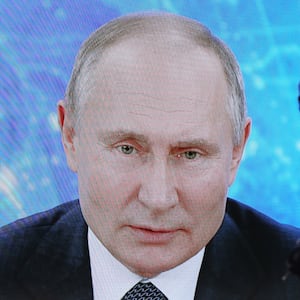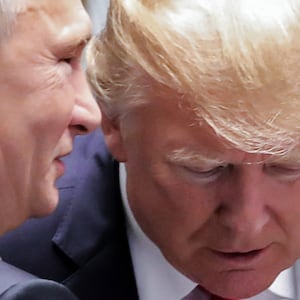The looming summit between U.S. President Joe Biden and Russian President Vladimir Putin—set to take place in Geneva on Wednesday—has unleashed a flurry of threats from the Kremlin’s propaganda machine, and a promise of staunch resistance to American demands on everything from cyberattacks to human rights abuses.
It has also triggered another bizarre press strategy: The debut and glorification of an infamous Capitol rioter on Russian airwaves.
On Sunday, Russian state TV aired an interview with insurrectionist Richard Barnett—notoriously pictured with his feet up on a desk in Nancy Pelosi’s office on Jan. 6—and his attorney, Joseph McBride.
Barnett, a self-proclaimed white nationalist, was introduced as a “colorful” individual, the same expression Putin frequently uses to describe Trump. McBride welcomed Rossiya-1 special correspondent Valentin Bogdanov into his office and FaceTimed his client, who appeared cheerful and at ease at his Arkansas ranch, flashing a big smile and showing off his car collection.
Bogdanov introduced Barnett, who was arrested following the Capitol riot and subsequently released pending trial, as “an American patriot” who protested against “the stolen election.” The network showcased clips from his exploits at the Capitol, where he wielded a stun-gun, stole mail from Pelosi’s office, and left a threatening note for the House Speaker.
Seemingly unaware of Russia’s notorious prison system, Barnett complained about the conditions of his brief imprisonment, alleged beatings of other “patriots” with whom he was detained, and threats he had received since his arrest.
“The trial is still ahead, there is no verdict, but retribution is already taking place,” the Russian correspondent said, referring to Barnett’s activities at the Capitol. Bogdanov asked him, “Would you do it again?” McBride quickly jumped in and urged his client not to answer the question until the legal proceedings were over.

Barnett replied, “I exercise my First Amendment rights every hour, every minute, and every day, and I will never stop.” Bogdanov concluded, “Everyone arrested in the Jan. 6 case feels that way.”
Russian state media have consistently claimed that the Capitol rioters were arrested merely for supporting Trump. Speaking at a business forum in St. Petersburg on June 4, Putin made clear his intent to rebuff Biden’s concerns about human rights in Russia by labeling prosecutions of the insurrectionists who stormed the U.S. Capitol as unjust. On Friday, Putin told NBC that their arrests were nothing other than “persecution for political opinions.”
The glorification of the Jan. 6 rioters is just one of several tactics Kremlin loyalists are using to disparage the U.S. in the lead-up to the summit.
Repeatedly citing Fox News talking points to corroborate their narrative, state TV hosts and experts spoke of Putin as a smarter, stronger, younger leader, who is in every way superior to Biden. This remarkable alignment led Alexei Naumov from the Russian International Affairs Council to conclude last Tuesday that, “For Republicans, Vladimir Putin is more of an ally than Biden. This is a death sentence for America’s leadership and its foreign policy.”
Last week, former President Donald Trump echoed Kremlin TV talking points by telling Biden “not to fall asleep” during his summit with Putin. Trump’s unusual affinity towards the Russian president had failed to compensate for his inability to move forward with tentative agreements reached by the two leaders at the Helsinki summit, which frustrated Kremlin-funded talking heads. While the former U.S. president had described his get-together with Putin as “a great and very productive meeting in Helsinki,” Russian experts and lawmakers disagreed.
Discussing the upcoming summit in Geneva last Sunday, notorious Kremlin propagandist Dmitry Kiselyov listed some of the “things Putin doesn’t like,” including his impatience for people who don’t keep their promises. Kiselyov praised the Russian president for his willingness to meet even with “difficult” characters like Trump but added that Putin “lost his interest” once he realized that Trump’s words rang hollow and his promises turned out to be empty.
This month, host of the state TV program 60 Minutes Evgeny Popov exclaimed, “I hope that our top officials have a plan, especially in light of an atrociously futile meeting with Trump. If Putin is going to see Biden, I hope that something will get signed.”
One item of continued interest to the Kremlin is an agreement on cybersecurity, championed by the Russians since the early 2000s. In 2017 and 2018, Putin proposed a joint Russian-American “Cybersecurity Unit,” an idea that was enthusiastically promoted by Trump until it prompted bipartisan backlash and was shot down by American national security officials.
On Friday, in his interview with MSNBC’s Keir Simmons, Putin claimed that U.S. allegations that Russian hackers were responsible for a series of cyberattacks in the U.S. were "farcical," but nonetheless insisted that he wants Biden to enter into an agreement with Russia on cyberspace.
Forming a joint task force with America’s adversary could provide the Kremlin with an inside look at U.S. methods and technologies used to investigate Russia’s attacks, and the Kremlin could continue its cyberoffensive through proxies and deny accountability. Even the symbolic signing of such an agreement would create a false impression of Russia’s cooperation with the U.S., positioning it as a peer as opposed to a malevolent foe. While the Kremlin repeatedly denies official ties to various acts of aggression in cyberspace, it actively interferes with U.S. efforts to extradite Russian hackers.
For all the talk of Russia’s desire to enter into a joint cybersecurity agreement, state TV provides a revealing look at popular sentiments behind the hackings. Appearing on 60 Minutes on June 3, Alexei Naumov opined, “During its entire existence, the United States lived with the feeling of invincibility… now they see that cybertentacles can reach any part of the world from anywhere, forcing America to its knees.”
Remarking on the recent hacking of beef supplier JBS by a Russian-speaking hacker gang earlier this month, lawmakers and experts on 60 Minutes mocked the U.S. and contemplated sending roadkill to feed “the crowds of hungry Americans.” Host Evgeny Popov was disappointed that the hack impacted only part of America’s meat supply.
“Our hackers didn’t take it far enough,” complained his wife and co-host Olga Skabeeva. Whether the latest series of hacks were state-directed or not, they serve the Kremlin's interests by both embarrassing the U.S. and attempting to force the mightiest nation on earth to engage with Russia as an equal partner.
Ukraine is another topic of great concern that will surely be raised at the summit. In recent months, Russian state media devolved into falsely claiming that Ukraine’s region of Donbas is “Russia’s land” and the only acceptable solution would involve the absorption of that territory—or Ukraine as a whole—by the Russian Federation.
At the same time, experts acknowledge that a purely military solution is unlikely to be successful—at least for now. “We won’t be able to solve this issue by military force. Everyone understands that there won’t be a nuclear war, or at least it isn’t likely… and there won’t be a limited nuclear strike, because that would encompass all of Eastern Europe,” Dmitry Abzalov, Director of the Center for Strategic Communications, said last week on 60 Minutes.
He added: “We’ll wait for the next Trump to arrive and press that button.”
The last thing on the Kremlin’s agenda is the topic of human rights. Russia is anticipating tough rhetoric from Biden, to which Putin is expected to unload a stream of “whataboutism” and gaslighting.
In anticipation of a heated exchange, Kremlin-funded networks adjusted their messaging about Biden’s health and fitness. After months of denigrating Biden’s physical condition, state TV host Vladimir Soloviev reluctantly admitted that the U.S. president appears to be very fit and “looks much better than Trump.” To explain away Biden’s ability to successfully face off with his Russian counterpart, the carefully cultivated image of a feeble oldster is being replaced with that of a shrewd and dangerous enemy.
On June 4, Federation Council Speaker Valentina Matviyenko told 60 Minutes, “If [the U.S.] tries to teach Russia democracy or something like that, the dialogue won’t work out and there won’t be any results.” In response to the question about Biden’s intent to discuss the unjust imprisonment of opposition leader Alexei Navalny, Kremlin spokesman Dmitry Peskov told CNN, “There’s nothing to talk about.”
Experts and hosts on Russian state TV are openly describing the forthcoming discussion on human rights as “the throwaway [trash]” part of the summit. “When they try to teach us about democracy… we could talk about our non-recognition of the legitimacy of their elections,” Olga Skabeeva, who has described the summit as “America’s funeral,” said earlier this month. Host Evgeny Popov concluded with a strong message to America, “We will dog-walk you.”
Hostility best sums up the general approach to the talks, while Russian officials and experts harbor no illusions with respect to its final outcome. When Biden arrived in Europe, Russian Deputy Foreign Minister Sergey Ryabkov told journalists that “the times of all kinds of resets are gone” and opined that “Russian-American relations may deteriorate even further in the future.”
“We’re acting in ways we’ve never acted before. We’ve clearly demonstrated: Don’t even utter a peep about human rights. Don’t stick your nose into our internal affairs. It’s none of your business,” state TV host Vladimir Soloviev said this month.
“That’s it,” he added. “The jokes are over.”




